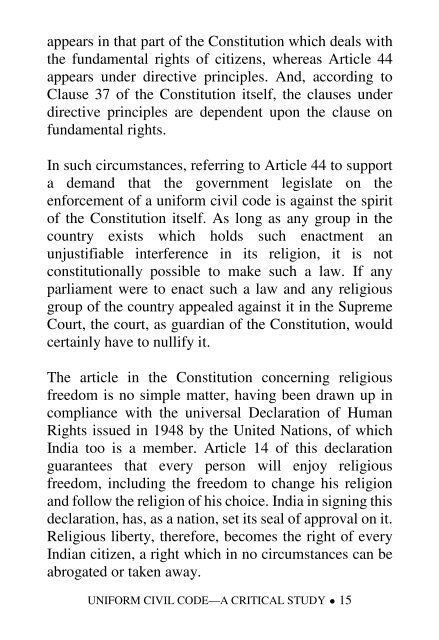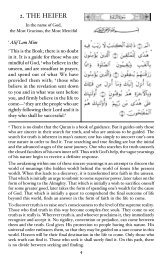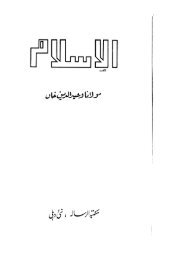You also want an ePaper? Increase the reach of your titles
YUMPU automatically turns print PDFs into web optimized ePapers that Google loves.
appears in that part of the Constitution which deals with<br />
the fundamental rights of citizens, whereas Article 44<br />
appears under directive principles. And, according to<br />
Clause 37 of the Constitution itself, the clauses under<br />
directive principles are dependent upon the clause on<br />
fundamental rights.<br />
In such circumstances, referring to Article 44 to support<br />
a demand that the government legislate on the<br />
enforcement of a uniform civil code is against the spirit<br />
of the Constitution itself. As long as any group in the<br />
country exists which holds such enactment an<br />
unjustifiable interference in its religion, it is not<br />
constitutionally possible to make such a law. If any<br />
parliament were to enact such a law and any religious<br />
group of the country appealed against it in the Supreme<br />
Court, the court, as guardian of the Constitution, would<br />
certainly have to nullify it.<br />
The article in the Constitution concerning religious<br />
freedom is no simple matter, having been drawn up in<br />
compliance with the universal Declaration of Human<br />
Rights issued in 1948 by the United Nations, of which<br />
India too is a member. Article 14 of this declaration<br />
guarantees that every person will enjoy religious<br />
freedom, including the freedom to change his religion<br />
and follow the religion of his choice. India in signing this<br />
declaration, has, as a nation, set its seal of approval on it.<br />
Religious liberty, therefore, becomes the right of every<br />
Indian citizen, a right which in no circumstances can be<br />
abrogated or taken away.<br />
UNIFORM CIVIL CODE—A CRITICAL STUDY 15
















